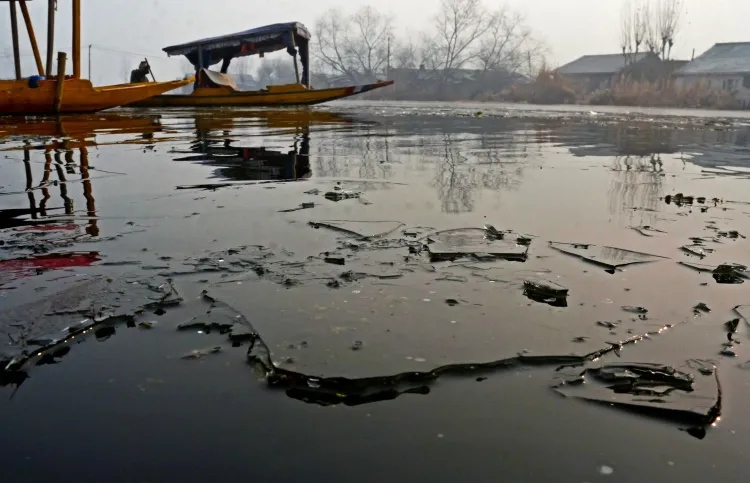Severe Cold Wave Hits Kashmir Again, Srinagar Plummets to -5.5°C

Synopsis
Key Takeaways
- Severe cold wave returns to Kashmir.
- Srinagar's temperature hits -5.5°C.
- Jammu enjoys pleasant weather.
- Health risks associated with extreme cold.
- ‘Chillai Kalan’ period ongoing.
Srinagar, Jan 27 (NationPress) A severe cold wave has once again enveloped Kashmir on Monday as the minimum temperature fell several degrees below the freezing mark, while the weather in the plains of J&K’s Jammu division remained pleasant.
Officials from the Meteorological (MeT) department reported that Srinagar recorded a minimum temperature of -5.5 degrees Celsius, with Gulmarg at -5.2 degrees and Pahalgam at -6.4 degrees.
In stark contrast, Jammu city enjoyed a mild climate with a minimum temperature of 5.8 degrees, while the base camp town of Mata Vaishno Devi, Katra, had 8.2 degrees, Batote 4.7 degrees, Banihal 1.5 degrees, and Bhaderwah 1.4 degrees.
As temperatures dropped, water pipes froze in Srinagar and other areas of the Valley, leading residents to light small fires around these pipes to thaw them. The morning saw very few people venturing outside in Srinagar, as most opted to stay indoors to escape the biting chill.
Morning transportation was challenging, but activity picked up as the sun rose.
The MeT department has predicted generally cloudy weather with light rain from the evening of January 28 until January 31.
The 40-day period of extreme winter known as ‘Chillai Kalan’ commenced on December 21 and concludes on January 30. The weather is expected to gradually improve starting February 1, although snowfall can occur until early March, even in the plains of the Kashmir Valley.
Meanwhile, weather conditions have improved in Jammu, where the maximum temperature reached 21.8 degrees Celsius on Sunday. Residents have begun to pack away their winter garments in favor of early summer attire. Wheat fields are thriving, indicating a prosperous Rabi crop for the diligent farmers of the Jammu division.
Health professionals have urged the population in Kashmir, particularly children and the elderly, to limit exposure to extreme cold as it can lead to blood vessel constriction, which increases the risk of myocardial infarction. Individuals with pre-existing heart conditions are particularly vulnerable to heart attacks and failures.









